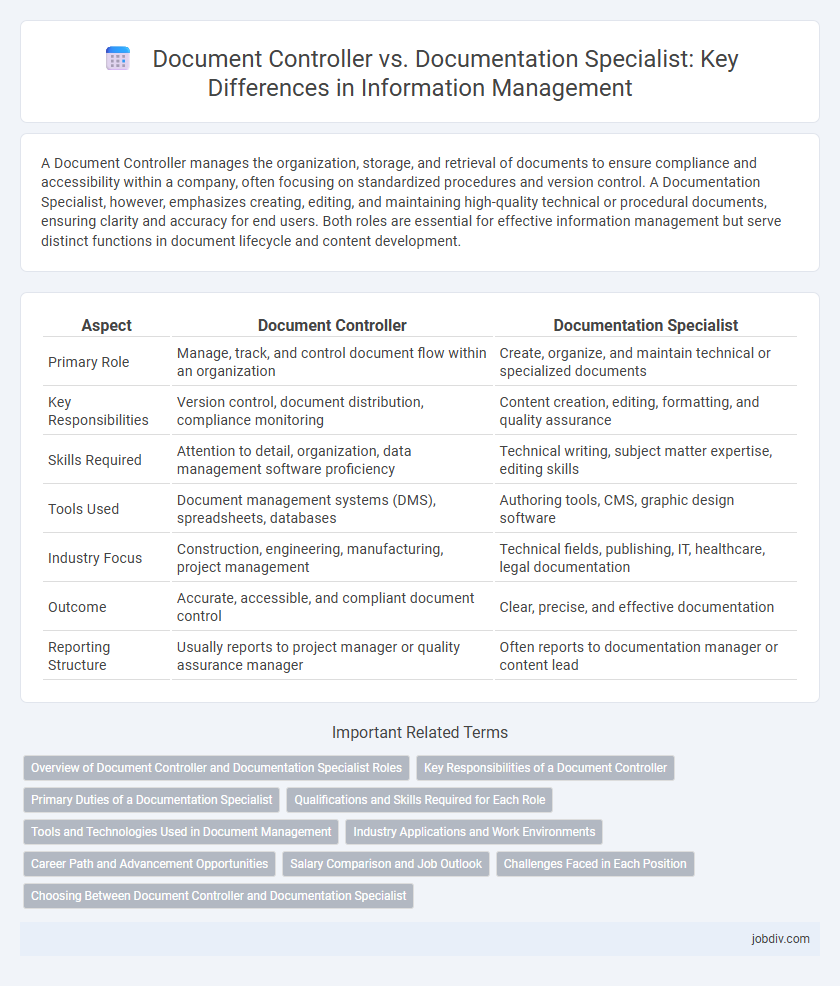A Document Controller manages the organization, storage, and retrieval of documents to ensure compliance and accessibility within a company, often focusing on standardized procedures and version control. A Documentation Specialist, however, emphasizes creating, editing, and maintaining high-quality technical or procedural documents, ensuring clarity and accuracy for end users. Both roles are essential for effective information management but serve distinct functions in document lifecycle and content development.
Table of Comparison
| Aspect | Document Controller | Documentation Specialist |
|---|---|---|
| Primary Role | Manage, track, and control document flow within an organization | Create, organize, and maintain technical or specialized documents |
| Key Responsibilities | Version control, document distribution, compliance monitoring | Content creation, editing, formatting, and quality assurance |
| Skills Required | Attention to detail, organization, data management software proficiency | Technical writing, subject matter expertise, editing skills |
| Tools Used | Document management systems (DMS), spreadsheets, databases | Authoring tools, CMS, graphic design software |
| Industry Focus | Construction, engineering, manufacturing, project management | Technical fields, publishing, IT, healthcare, legal documentation |
| Outcome | Accurate, accessible, and compliant document control | Clear, precise, and effective documentation |
| Reporting Structure | Usually reports to project manager or quality assurance manager | Often reports to documentation manager or content lead |
Overview of Document Controller and Documentation Specialist Roles
Document Controllers manage the storage, organization, and retrieval of documents ensuring compliance with company policies and industry regulations. Documentation Specialists focus on creating, editing, and maintaining accurate and detailed documentation to support business operations and project requirements. Both roles are essential for efficient information management but differ in emphasis on document handling versus content creation.
Key Responsibilities of a Document Controller
A Document Controller manages the creation, organization, and storage of documents, ensuring compliance with industry standards and confidentiality requirements. They track document versions, maintain access controls, and support audits by retrieving necessary records efficiently. These key responsibilities differentiate them from Documentation Specialists, who primarily focus on content development and technical writing.
Primary Duties of a Documentation Specialist
A Documentation Specialist primarily manages the organization, storage, and retrieval of company documents, ensuring compliance with regulatory standards and internal policies. They coordinate document control processes, maintain document databases, and oversee document version control to guarantee accuracy and accessibility. Their role involves preparing, reviewing, and distributing technical documentation to support project teams and operational workflows.
Qualifications and Skills Required for Each Role
Document Controllers require strong organizational skills, proficiency in document management software, and attention to detail to ensure accurate record-keeping and compliance with industry standards. Documentation Specialists often need advanced knowledge of document control processes, expertise in technical writing, and familiarity with regulatory requirements to create and maintain comprehensive documentation. Both roles demand excellent communication skills and the ability to manage large volumes of data efficiently, but Documentation Specialists typically require higher education or certifications related to information management.
Tools and Technologies Used in Document Management
Document Controllers primarily utilize enterprise content management (ECM) systems like SharePoint, Aconex, and Documentum to organize, track, and control access to documents, ensuring regulatory compliance and version control. Documentation Specialists often employ advanced authoring and collaboration tools such as Adobe FrameMaker, MadCap Flare, and Confluence to create, edit, and manage technical content with precision and consistency. Both roles leverage automation technologies including OCR (Optical Character Recognition) and metadata tagging systems to enhance document retrieval efficiency and maintain accurate documentation workflows.
Industry Applications and Work Environments
Document Controllers primarily operate in construction, engineering, and manufacturing industries, managing project documentation and ensuring compliance with regulatory standards. Documentation Specialists are prevalent in healthcare, legal, and IT sectors, focusing on organizing, maintaining, and optimizing digital records for accessibility and accuracy. Both roles require proficiency in document management systems but differ in industry-specific regulations and workflow complexities.
Career Path and Advancement Opportunities
Document Controllers typically manage the organization, storage, and retrieval of project documents, often serving entry to mid-level roles in industries like construction and engineering. Documentation Specialists progress by developing expertise in information governance, compliance standards, and digital management systems, enabling advancement to senior roles such as records manager or compliance officer. Career growth for Documentation Specialists often includes specialization in regulatory documentation or transitioning into broader information management and audit positions.
Salary Comparison and Job Outlook
Document Controllers typically earn an average salary ranging from $45,000 to $60,000 annually, while Documentation Specialists command higher wages, often between $55,000 and $75,000, reflecting their broader expertise in managing information processes. Job outlook for both roles remains strong, with demand growing by approximately 8% over the next decade, driven by increasing regulatory requirements and the need for accurate record-keeping in industries like construction, healthcare, and IT. Documentation Specialists benefit from more diverse career advancement opportunities, often transitioning into compliance, quality assurance, or information management positions.
Challenges Faced in Each Position
Document Controllers often face challenges in managing large volumes of evolving project documents while ensuring strict compliance with regulatory standards and version control protocols. Documentation Specialists encounter difficulties in maintaining accuracy and consistency across diverse formats, requiring strong attention to detail and expertise in various documentation tools. Both roles require efficient communication and coordination with multiple departments to prevent errors and streamline information flow.
Choosing Between Document Controller and Documentation Specialist
Choosing between a Document Controller and a Documentation Specialist depends on the organization's needs for document management and compliance. A Document Controller typically focuses on organizing, storing, and maintaining document flow within projects and ensuring version control. In contrast, a Documentation Specialist handles the creation, editing, and quality assurance of documents, often requiring stronger expertise in content accuracy and regulatory standards.
Document Controller vs Documentation Specialist Infographic

 jobdiv.com
jobdiv.com